Unit 9 Do You Like Bananas Section A 导学案(含答案)
文档属性
| 名称 | Unit 9 Do You Like Bananas Section A 导学案(含答案) |
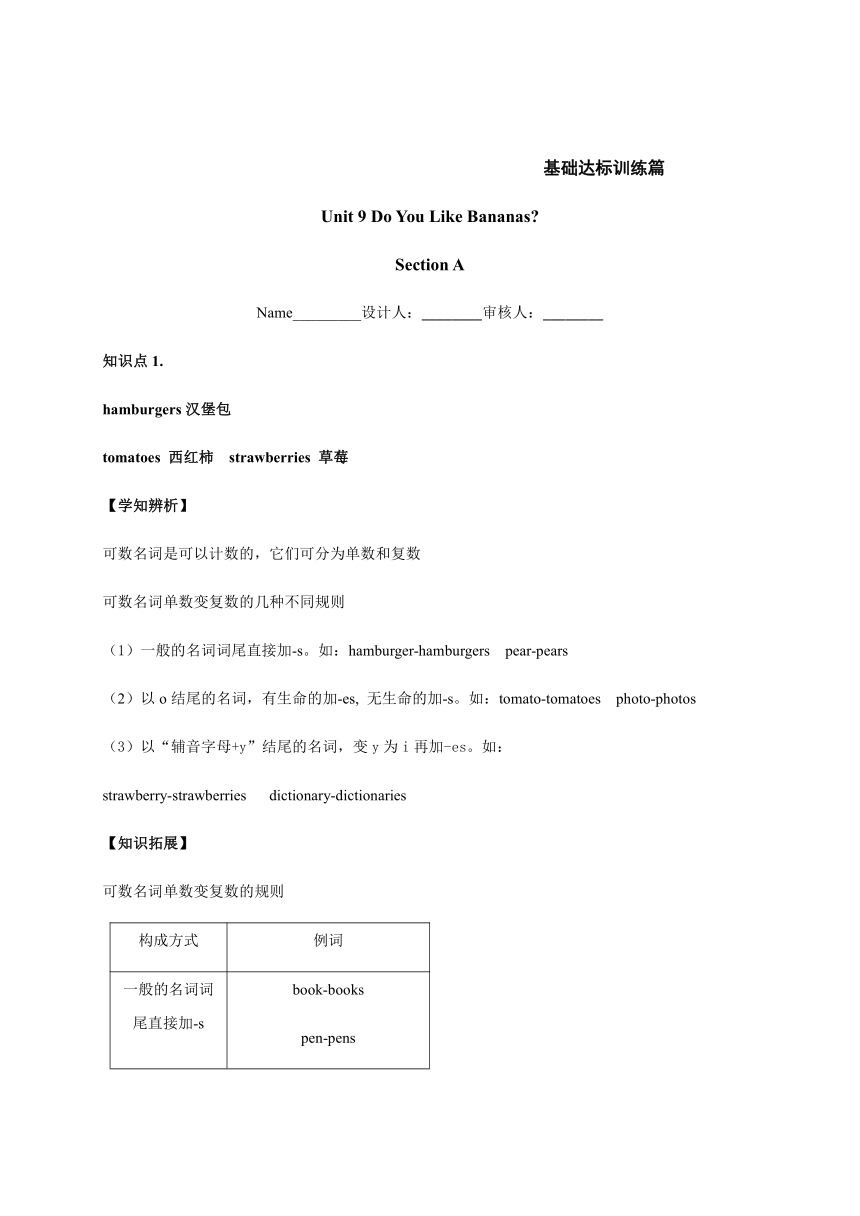
|
|
| 格式 | docx | ||
| 文件大小 | 21.2KB | ||
| 资源类型 | 教案 | ||
| 版本资源 | 鲁教版 | ||
| 科目 | 英语 | ||
| 更新时间 | 2022-08-31 17:46:12 | ||
图片预览

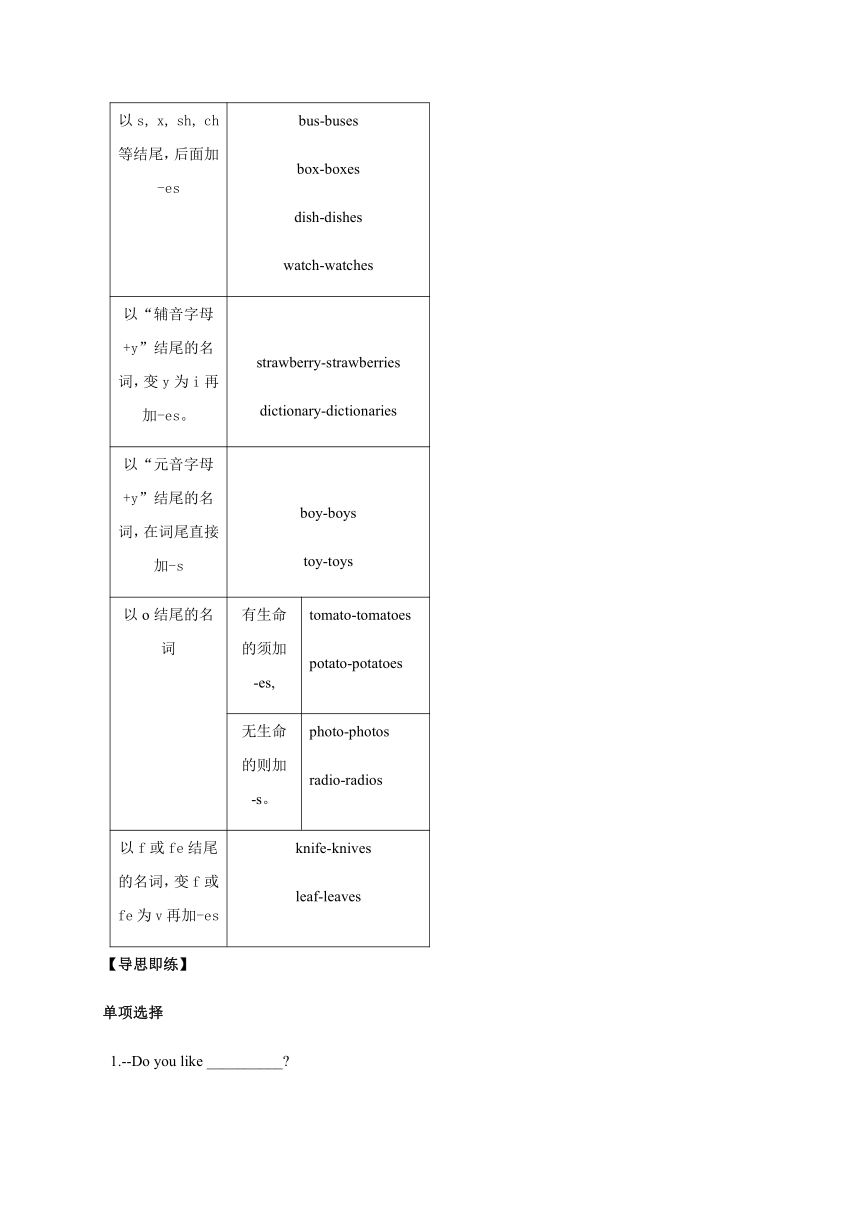
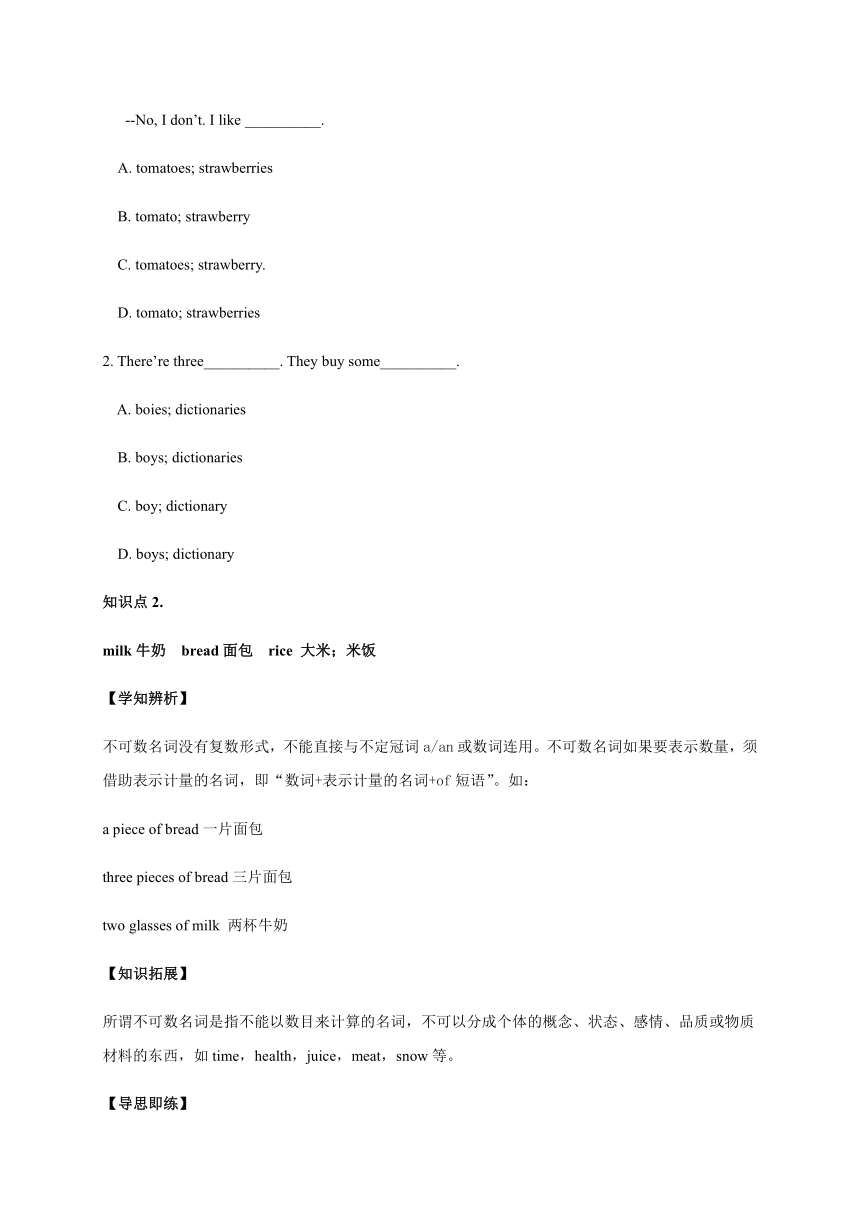
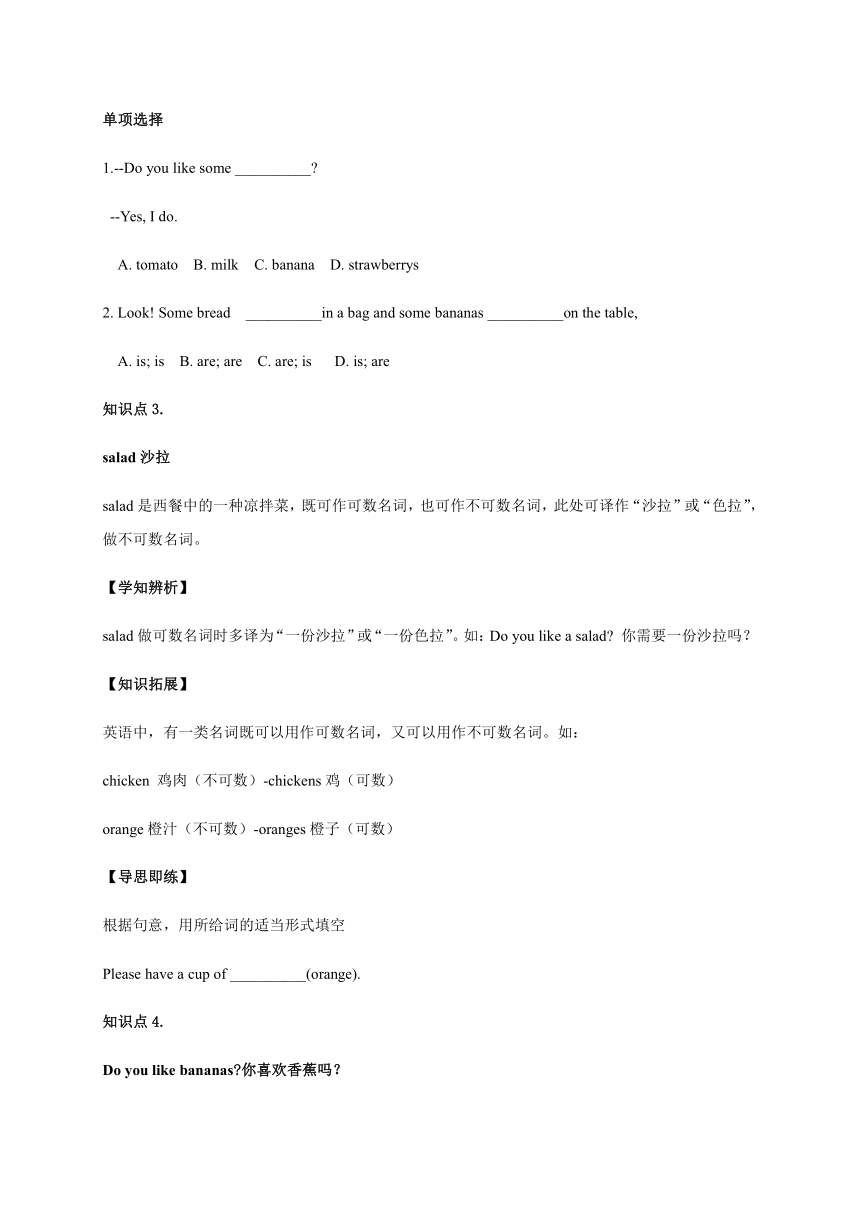
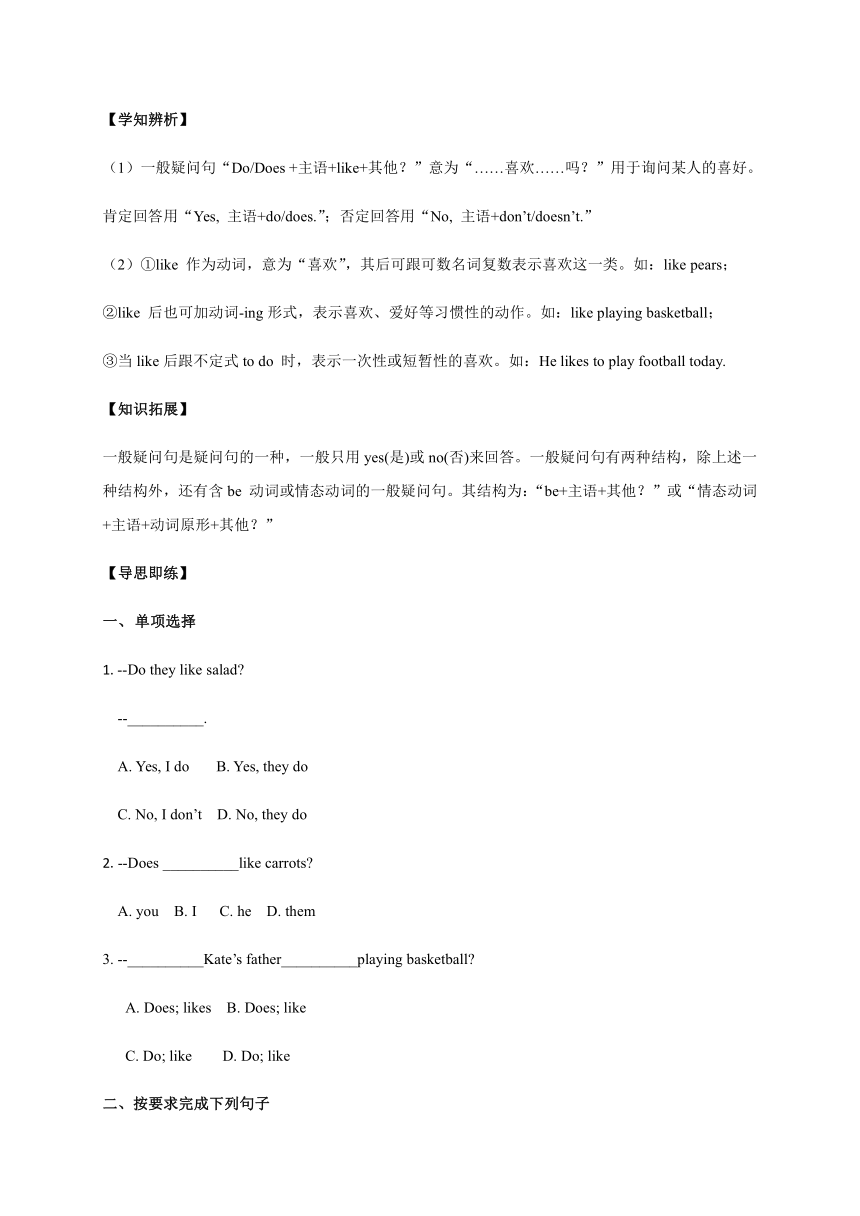
文档简介
基础达标训练篇
Unit 9 Do You Like Bananas
Section A
Name_________设计人:________审核人:________
知识点1.
hamburgers汉堡包
tomatoes 西红柿 strawberries 草莓
【学知辨析】
可数名词是可以计数的,它们可分为单数和复数
可数名词单数变复数的几种不同规则
(1)一般的名词词尾直接加-s。如:hamburger-hamburgers pear-pears
(2)以o结尾的名词,有生命的加-es, 无生命的加-s。如:tomato-tomatoes photo-photos
(3)以“辅音字母+y”结尾的名词,变y为i再加-es。如:
strawberry-strawberries dictionary-dictionaries
【知识拓展】
可数名词单数变复数的规则
构成方式 例词
一般的名词词尾直接加-s book-books pen-pens
以s, x, sh, ch等结尾,后面加-es bus-buses box-boxes dish-dishes watch-watches
以“辅音字母+y”结尾的名词,变y为i再加-es。 strawberry-strawberries dictionary-dictionaries
以“元音字母+y”结尾的名词,在词尾直接加-s boy-boys toy-toys
以o结尾的名词 有生命的须加-es, tomato-tomatoes potato-potatoes
无生命的则加-s。 photo-photos radio-radios
以f或fe结尾的名词,变f或fe为v再加-es knife-knives leaf-leaves
【导思即练】
单项选择
1.--Do you like __________
--No, I don’t. I like __________.
A. tomatoes; strawberries
B. tomato; strawberry
C. tomatoes; strawberry.
D. tomato; strawberries
2. There’re three__________. They buy some__________.
A. boies; dictionaries
B. boys; dictionaries
C. boy; dictionary
D. boys; dictionary
知识点2.
milk牛奶 bread面包 rice 大米;米饭
【学知辨析】
不可数名词没有复数形式,不能直接与不定冠词a/an或数词连用。不可数名词如果要表示数量,须借助表示计量的名词,即“数词+表示计量的名词+of短语”。如:
a piece of bread一片面包
three pieces of bread三片面包
two glasses of milk 两杯牛奶
【知识拓展】
所谓不可数名词是指不能以数目来计算的名词,不可以分成个体的概念、状态、感情、品质或物质材料的东西,如time,health,juice,meat,snow等。
【导思即练】
单项选择
1.--Do you like some __________
--Yes, I do.
A. tomato B. milk C. banana D. strawberrys
2. Look! Some bread __________in a bag and some bananas __________on the table,
A. is; is B. are; are C. are; is D. is; are
知识点3.
salad沙拉
salad是西餐中的一种凉拌菜,既可作可数名词,也可作不可数名词,此处可译作“沙拉”或“色拉”,做不可数名词。
【学知辨析】
salad做可数名词时多译为“一份沙拉”或“一份色拉”。如:Do you like a salad 你需要一份沙拉吗?
【知识拓展】
英语中,有一类名词既可以用作可数名词,又可以用作不可数名词。如:
chicken 鸡肉(不可数)-chickens鸡(可数)
orange橙汁(不可数)-oranges橙子(可数)
【导思即练】
根据句意,用所给词的适当形式填空
Please have a cup of __________(orange).
知识点4.
Do you like bananas 你喜欢香蕉吗?
【学知辨析】
(1)一般疑问句“Do/Does +主语+like+其他?”意为“……喜欢……吗?”用于询问某人的喜好。
肯定回答用“Yes, 主语+do/does.”;否定回答用“No, 主语+don’t/doesn’t.”
(2)①like 作为动词,意为“喜欢”,其后可跟可数名词复数表示喜欢这一类。如:like pears;
②like 后也可加动词-ing形式,表示喜欢、爱好等习惯性的动作。如:like playing basketball;
③当like后跟不定式to do 时,表示一次性或短暂性的喜欢。如:He likes to play football today.
【知识拓展】
一般疑问句是疑问句的一种,一般只用yes(是)或no(否)来回答。一般疑问句有两种结构,除上述一种结构外,还有含be 动词或情态动词的一般疑问句。其结构为:“be+主语+其他?”或“情态动词+主语+动词原形+其他?”
【导思即练】
单项选择
1. --Do they like salad
--__________.
A. Yes, I do B. Yes, they do
C. No, I don’t D. No, they do
2.--Does __________like carrots
A. you B. I C. he D. them
3. --__________Kate’s father__________playing basketball
A. Does; likes B. Does; like
C. Do; like D. Do; like
二、按要求完成下列句子
1. Does Tom like eggs for breakfast (做否定回答)
__________,____________________.
2. My brother plays football. (改为一般疑问句)
__________your brother __________ football
知识点5.
Hey, John’s birthday dinner is next week.嗨,约翰的生日宴会在下周。
【学知辨析】
dinner意为“正餐,晚餐”。
dinner泛指“晚餐”时,用作不可数名词,其前不加冠词。同义词为supper。supper在英文中指晚餐,dinner在英文中常用来表示一天中的正餐,既可以指晚餐,也可以指午餐,它较为正式,邀请朋友赴宴时通常用dinner。
【知识拓展】
一日三餐分别表达为breakfast(早餐),lunch(午餐),dinner/supper(晚餐)
【导思即练】
单项选择
--Do you want to go to my birthday __________
--A. breakfast B. lunch C. dinner D. supper
知识点6.
Let’s think about the food.让我们考虑一下食物吧。
【学知辨析】
(1)think about 意为“考虑”,about 为介词,其后可接名词,代词或动词-ing形式。
(2)food 意为“食物,食品”。当表示事物的总称时,用作不可数名词,作主语时,谓语动词用第三人称单数。如:There is some food on the table.
【知识拓展】
food 还可以用作可数名词,表示特定种类的食品。如:There are some different foods: chicken, apples, rice, carrots.
【导思即练】
单项选择
1.--Do you think about __________ earlier
--Yes, I do.
A. have dinner B. having dinner
C. have the dinner D. having the dinner
2. --What do you think__________ the story
--Great!
A. on B. to C. up D. about
知识点7.
How about burgers, vegetable salad, and some fruit 汉堡包、蔬菜沙拉和一些水果怎么样?
【学知辨析】
(1)how about意为“……怎么样?”用于提出建议或请求,相当于“what about……?”。
(2)fruit意为“水果”,当表示水果总称时,用作不可数名词;当表示水果的种类时,用作可数名词。
【知识拓展】
其他常见表示建议的句型
(1)“Let’s +动词原形+其他,shall we ”意为“让我们……,好吗?”
(2)“Why not +动词原形+其他?”/ “Why don’t you+动词原形+其他?”意为“为什么不……?”
(3)“Would you like to +动词原形+其他?”意为“你愿意……吗?”
(4) “you’d better (not)+动词原形+其他”意为“你最好(不)要做……”。
【导思即练】
单项选择
1. There are some__________ in the box, like apples, pears and strawberries.
A. fruit B. fruits
C. vegetable D. vegetables
2. How about__________ an apple
A. to have B. having
C. have D. has
知识点8.
So, let’s get salad. 那么,咱们拿沙拉吧。
【学知辨析】
so 此处用作连词,意为“那么”,用于引出评论或问题。
【知识拓展】
so作连词时,还可以译为“因此,所以”。如:She is ill today, so she can’t go to school.
【导思即练】
1.根据提示完成对话
--Do you__________ fruit (喜欢)
--No, I don’t.
--__________ __________some vegetables (怎么样)
--__________ good! I like vegetables.(听起来)
--__________, let’s get some vegetable salad.(那么)
U9基础达标训练篇答案
Section A
知识点1.1. A 2. B
知识点2.1. B 2. D
知识点3.orange
知识点4.一、1. B 2.C3. B
二、1. No, he doesn’t.
2. Does; play
知识点5.C
知识点6. 1. B 2. D
知识点7.1. B 2. B
知识点8.1. like; How about; Sound; So
Unit 9 Do You Like Bananas
Section A
Name_________设计人:________审核人:________
知识点1.
hamburgers汉堡包
tomatoes 西红柿 strawberries 草莓
【学知辨析】
可数名词是可以计数的,它们可分为单数和复数
可数名词单数变复数的几种不同规则
(1)一般的名词词尾直接加-s。如:hamburger-hamburgers pear-pears
(2)以o结尾的名词,有生命的加-es, 无生命的加-s。如:tomato-tomatoes photo-photos
(3)以“辅音字母+y”结尾的名词,变y为i再加-es。如:
strawberry-strawberries dictionary-dictionaries
【知识拓展】
可数名词单数变复数的规则
构成方式 例词
一般的名词词尾直接加-s book-books pen-pens
以s, x, sh, ch等结尾,后面加-es bus-buses box-boxes dish-dishes watch-watches
以“辅音字母+y”结尾的名词,变y为i再加-es。 strawberry-strawberries dictionary-dictionaries
以“元音字母+y”结尾的名词,在词尾直接加-s boy-boys toy-toys
以o结尾的名词 有生命的须加-es, tomato-tomatoes potato-potatoes
无生命的则加-s。 photo-photos radio-radios
以f或fe结尾的名词,变f或fe为v再加-es knife-knives leaf-leaves
【导思即练】
单项选择
1.--Do you like __________
--No, I don’t. I like __________.
A. tomatoes; strawberries
B. tomato; strawberry
C. tomatoes; strawberry.
D. tomato; strawberries
2. There’re three__________. They buy some__________.
A. boies; dictionaries
B. boys; dictionaries
C. boy; dictionary
D. boys; dictionary
知识点2.
milk牛奶 bread面包 rice 大米;米饭
【学知辨析】
不可数名词没有复数形式,不能直接与不定冠词a/an或数词连用。不可数名词如果要表示数量,须借助表示计量的名词,即“数词+表示计量的名词+of短语”。如:
a piece of bread一片面包
three pieces of bread三片面包
two glasses of milk 两杯牛奶
【知识拓展】
所谓不可数名词是指不能以数目来计算的名词,不可以分成个体的概念、状态、感情、品质或物质材料的东西,如time,health,juice,meat,snow等。
【导思即练】
单项选择
1.--Do you like some __________
--Yes, I do.
A. tomato B. milk C. banana D. strawberrys
2. Look! Some bread __________in a bag and some bananas __________on the table,
A. is; is B. are; are C. are; is D. is; are
知识点3.
salad沙拉
salad是西餐中的一种凉拌菜,既可作可数名词,也可作不可数名词,此处可译作“沙拉”或“色拉”,做不可数名词。
【学知辨析】
salad做可数名词时多译为“一份沙拉”或“一份色拉”。如:Do you like a salad 你需要一份沙拉吗?
【知识拓展】
英语中,有一类名词既可以用作可数名词,又可以用作不可数名词。如:
chicken 鸡肉(不可数)-chickens鸡(可数)
orange橙汁(不可数)-oranges橙子(可数)
【导思即练】
根据句意,用所给词的适当形式填空
Please have a cup of __________(orange).
知识点4.
Do you like bananas 你喜欢香蕉吗?
【学知辨析】
(1)一般疑问句“Do/Does +主语+like+其他?”意为“……喜欢……吗?”用于询问某人的喜好。
肯定回答用“Yes, 主语+do/does.”;否定回答用“No, 主语+don’t/doesn’t.”
(2)①like 作为动词,意为“喜欢”,其后可跟可数名词复数表示喜欢这一类。如:like pears;
②like 后也可加动词-ing形式,表示喜欢、爱好等习惯性的动作。如:like playing basketball;
③当like后跟不定式to do 时,表示一次性或短暂性的喜欢。如:He likes to play football today.
【知识拓展】
一般疑问句是疑问句的一种,一般只用yes(是)或no(否)来回答。一般疑问句有两种结构,除上述一种结构外,还有含be 动词或情态动词的一般疑问句。其结构为:“be+主语+其他?”或“情态动词+主语+动词原形+其他?”
【导思即练】
单项选择
1. --Do they like salad
--__________.
A. Yes, I do B. Yes, they do
C. No, I don’t D. No, they do
2.--Does __________like carrots
A. you B. I C. he D. them
3. --__________Kate’s father__________playing basketball
A. Does; likes B. Does; like
C. Do; like D. Do; like
二、按要求完成下列句子
1. Does Tom like eggs for breakfast (做否定回答)
__________,____________________.
2. My brother plays football. (改为一般疑问句)
__________your brother __________ football
知识点5.
Hey, John’s birthday dinner is next week.嗨,约翰的生日宴会在下周。
【学知辨析】
dinner意为“正餐,晚餐”。
dinner泛指“晚餐”时,用作不可数名词,其前不加冠词。同义词为supper。supper在英文中指晚餐,dinner在英文中常用来表示一天中的正餐,既可以指晚餐,也可以指午餐,它较为正式,邀请朋友赴宴时通常用dinner。
【知识拓展】
一日三餐分别表达为breakfast(早餐),lunch(午餐),dinner/supper(晚餐)
【导思即练】
单项选择
--Do you want to go to my birthday __________
--A. breakfast B. lunch C. dinner D. supper
知识点6.
Let’s think about the food.让我们考虑一下食物吧。
【学知辨析】
(1)think about 意为“考虑”,about 为介词,其后可接名词,代词或动词-ing形式。
(2)food 意为“食物,食品”。当表示事物的总称时,用作不可数名词,作主语时,谓语动词用第三人称单数。如:There is some food on the table.
【知识拓展】
food 还可以用作可数名词,表示特定种类的食品。如:There are some different foods: chicken, apples, rice, carrots.
【导思即练】
单项选择
1.--Do you think about __________ earlier
--Yes, I do.
A. have dinner B. having dinner
C. have the dinner D. having the dinner
2. --What do you think__________ the story
--Great!
A. on B. to C. up D. about
知识点7.
How about burgers, vegetable salad, and some fruit 汉堡包、蔬菜沙拉和一些水果怎么样?
【学知辨析】
(1)how about意为“……怎么样?”用于提出建议或请求,相当于“what about……?”。
(2)fruit意为“水果”,当表示水果总称时,用作不可数名词;当表示水果的种类时,用作可数名词。
【知识拓展】
其他常见表示建议的句型
(1)“Let’s +动词原形+其他,shall we ”意为“让我们……,好吗?”
(2)“Why not +动词原形+其他?”/ “Why don’t you+动词原形+其他?”意为“为什么不……?”
(3)“Would you like to +动词原形+其他?”意为“你愿意……吗?”
(4) “you’d better (not)+动词原形+其他”意为“你最好(不)要做……”。
【导思即练】
单项选择
1. There are some__________ in the box, like apples, pears and strawberries.
A. fruit B. fruits
C. vegetable D. vegetables
2. How about__________ an apple
A. to have B. having
C. have D. has
知识点8.
So, let’s get salad. 那么,咱们拿沙拉吧。
【学知辨析】
so 此处用作连词,意为“那么”,用于引出评论或问题。
【知识拓展】
so作连词时,还可以译为“因此,所以”。如:She is ill today, so she can’t go to school.
【导思即练】
1.根据提示完成对话
--Do you__________ fruit (喜欢)
--No, I don’t.
--__________ __________some vegetables (怎么样)
--__________ good! I like vegetables.(听起来)
--__________, let’s get some vegetable salad.(那么)
U9基础达标训练篇答案
Section A
知识点1.1. A 2. B
知识点2.1. B 2. D
知识点3.orange
知识点4.一、1. B 2.C3. B
二、1. No, he doesn’t.
2. Does; play
知识点5.C
知识点6. 1. B 2. D
知识点7.1. B 2. B
知识点8.1. like; How about; Sound; So
同课章节目录
- Unit 1 Good morning
- Section A
- Section B
- Unit 2 What's this in English?
- Section A
- Section B
- Unit 3 What color is it?
- Section A
- Section B
- Unit 4 My name's is Gina
- Section A
- Section B
- Unit 5 This is my siste
- Section A
- Section B
- Unit 6 Is this your pencil?
- Section A
- Section B
- Unit 7 Where's my schoolbag?
- Section A
- Section B
- Unit 8 Do you have a soccer ball?
- Sectioan A
- Sectioan B
- Unit 9 Do you like bananas?
- Section A
- Section B
- Unit 10 How much are these socks?
- Section A
- Section B
